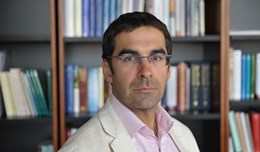‘Epistles of the Brethren of purity’

IIS Publishes Introductory Volume on the Ikhwan al-Safa’
In association with the Oxford University Press, the IIS has published The Ikhwan al-Safa’ and their Rasa’il: An Introduction, which inaugurates the much-anticipated publication of the Rasa’il Ikhwan al-Safa’ (Epistles of the Brethren of Purity). As a preparatory volume, it offers a broad overview of this important and influential corpus, detailing conceptual and historical aspects of the work, as well as considering some more technical aspects of certain epistles.

Intellectual Interactions Conference - discussion with Prof Carmela Baffioni
Publication Series

Launch of The Ikhwan al-Safa’ and their Rasa’il
The Ikhwan al-Safa’ and their Rasa’il: An Introduction, published by The Institute of Ismaili Studies, in association with Oxford University Press, was launched in Nairobi and Mombasa in June 2009. The events in Kenya, which marked the first worldwide launch of the publication, were attended by members of the local academic and Muslim communities.

The Case of the Animals versus Man: A New Children’s Publication
In association with The Institute of Ismaili Studies, Dar al-Saqi in Beirut has recently published a colourfully illustrated book for children aged 13-14 in Arabic, entitled Da‘wa al-hayawan did al-insan ‘inda malik al-jann (The Case of the Animals against Man before the King of the Jinn).

Professor Baffioni speaks at the Institute on the Rasa’il Ikhwan al-Safa’
Professor Carmela Baffioni presented a lecture on Prophecy, Imamat and Sapiential Rule in the Ikhwan al-Safa' at the Institute on February 23rd. As part of its programmatic endeavours, the Institute sponsors seminars, conferences and public lectures that examine various facets of Islamic studies and themes of relevance to contemporary Muslim societies.

Professor Carmela Baffioni

Sciences of the Soul and Intellect, Part I – A New Volume in the Epistles Series
Sciences of the Soul and Intellect, Part I; An Arabic Critical Edition and English Translation of Epistles 32-36 has a strong cosmological orientation, with a particular focus on the relationship between microcosm and macrocosm, earthly and celestial. The content of this publication is more metaphysical and abstract, whilst in a sense also more human.
Kufa
After the defeat of the Iranian Sasanian dynasty in 637-638 CE, the conquering Muslim army occupied Iraq and established on the banks of the Euphrates a garrison town called Kufa. The new province would henceforth be ruled from this newly founded settlement. In time, it grew into a major administrative capital that had a mosque, a governor's palace, markets, and accommodation for a growing population of soldiers and immigrants.

The Comprehensive Epistle and its Useful Benefits
Dr Mourad Kacimi explores al-Risāla al-jāmiʿa (The Comprehensive Epistle) and the secretive group who composed it in this Arabic-language lecture.

IIS Awards Dissertation Writing Scholarship
The IIS is pleased to announce the award of its Dissertation Writing Scholarship to Shatha Almutawa who is studying at the University of Chicago Divinity School, USA.

Professor Nanji Speaks on Pluralism and its Contents
The Director of the Institute of Ismaili Studies (IIS), Professor Azim Nanji, spoke on ‘Pluralism and its contents’ at a seminar on 23 November 2007 at Aga Khan University’s Institute for the Study of Muslim Civilisations (AKU-ISMC). The seminar was the last in the series ‘Possibility of Pluralism’, which discussed pluralism and its specific relevance to Muslim societies.

Intellectual Interactions in the Islamic World: The Ismaili Thread

Brethren of Purity

GPISH Graduates Appointed to Senior Management Positions at the IIS
"The Department of Academic Research and Publications at the IIS is a unique place; I believe that in this department we can do wonderful things in the future by pushing ourselves to achieve even higher academic levels of scholarship. The better we manage our research, the better we will be able to promote knowledge. During my student years I was supported by the IIS and to be able to contribute back in the area of academic research, is a dream come true”- Dr Omar Alí-de-Unzaga.
